Overseas Territories confront climate challenges at COP29
As an extension of the United Nations Framework Convention on Climate Change (UNFCCC), this year's conference held particular significance for small and vulnerable regions like the British Overseas Territories (BOTs), which face disproportionate risks from rising sea levels, extreme weather events, and biodiversity loss.
NEWS FROM THE OVERSEAS TERRITORIESBERMUDAGIBRALTARMONTSERRATBRITISH VIRGIN ISLANDSPITCAIRN ISLANDSTRISTAN DA CUNHASOUTH GEORGIA & SOUTH SANDWICH ISLANDSST HELENAASCENSIONANGUILLAFALKLAND ISLANDSCAYMAN ISLANDSTURKS & CAICOS ISLANDS
The 29th Conference of the Parties (COP29), in Baku, Azerbaijan, marked a pivotal moment in global climate negotiations, as nearly 200 nations and territories came together to tackle the escalating climate crisis. As an extension of the United Nations Framework Convention on Climate Change (UNFCCC), this year's conference held particular significance for small and vulnerable regions like the British Overseas Territories (BOTs), which face disproportionate risks from rising sea levels, extreme weather events, and biodiversity loss.
The UK and its Overseas Territories together form the world's fifth-largest marine estate, boasting extraordinary biodiversity. Over 90% of the UK's unique species are found within these territories, which encompass precious ocean ecosystems stretching from the Antarctic to the Caribbean and from the South Atlantic to the Indian Ocean. However, these small, dispersed communities face significant challenges in safeguarding their invaluable natural heritage.
The UK COP Pavilion
On Wednesday, 20th November, the UK COP Pavilion hosted an engaging discussion titled Response to Climate Change: The Special Case of Small Island UK Overseas Territories. Moderated by James Ellsmoor, CEO of Island Innovation, the hour-long session brought together representatives from territories such as Bermuda, Anguilla, and Gibraltar, among others. The panel delved into the unique challenges posed by climate change in the British Overseas Territories (BOTs) and explored innovative solutions to address these pressing issues. Some leaders appeared via a video played at the event, which you can find here.
Bermuda: Hon. Walter Roban, Bermuda Deputy Premier, Minister of Home Affairs
During the session, Mr. Roban emphasized the multifaceted threats climate change poses to Bermuda. He highlighted increased storm activity, rising sea temperatures, elevated sea levels, higher ocean acidity, and disruptions to the Gulf Stream’s flow as significant challenges. Coupled with the persistent issue of plastic pollution, these factors are placing Bermuda’s delicate ecosystem under unprecedented and intense pressure.
Bermuda has also launched the Bermuda Ocean Prosperity Program to protect their oceans while fostering the sustainable use of their ocean resources for present and future generations.
Gibraltar: Dr John Cortes, Gibraltar Environment Minister (via a video played)
Dr Cortes recognised that the Mediterranean is already suffering the impacts of climate change with warmer and more acidic waters affecting their marine ecosystems. Gibraltar is witnessing a rise in the spread of invasive species such as invasive seaweed (Rugulopterix Okamurae), which has overtaken their beaches, threatening the tourism industry and affecting marine biodiversity.
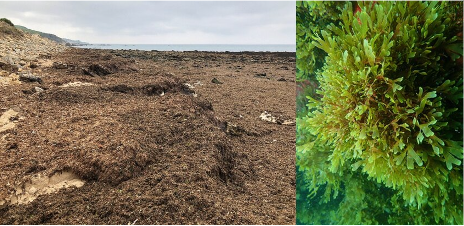

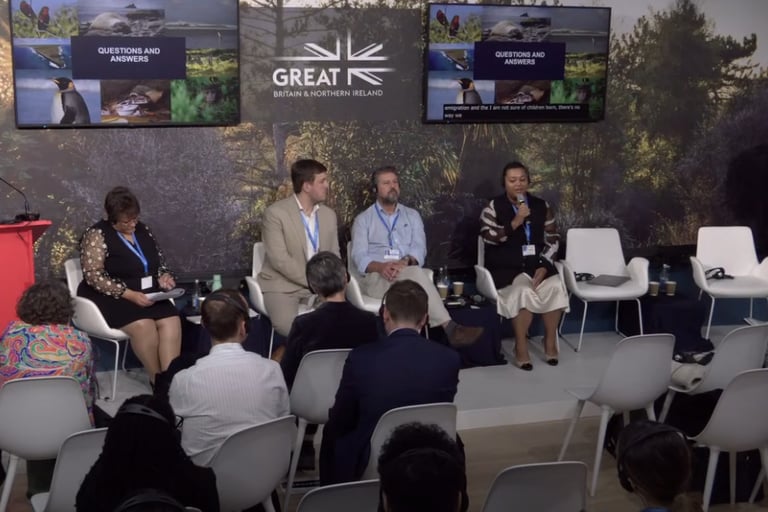

Invasive seaweed on the coast of the Strait of Gibraltar
Speaking during the discussion, Dr Cortes commented that the BOTs can act as examples for foreign environmental governance, especially in small islands. He stated that there are challenges in these small islands in environmental governance including energy generation, waste disposal and the protection of wildlife and habitats, given the small space available and all the competing factors within the small space.
He noted the difference in how the BOTs deal with these challenges but recognised how they all have things in common. The BOTs are all at the receiving end of the effects of climate change, especially the Caribbean states and territories. Dr Cortes praised the different ways the BOTs tackled climate change through strategies, policy, legislation and advocacy. He commented on Gibraltar’s decision to publish numerous strategies and to publish a 25-year environment plan, which will give Gibraltar the template for taking action in these areas.
Montserrat: Hon. Creston Buffonge, Montserrat Environment Minister
The Minister highlighted the challenges faced by fishermen, who are struggling with declining catches due to the increasing frequency of rough weather. Additionally, signs of coral bleaching are becoming evident, significantly affecting marine life and the livelihoods of those who depend on the marine industry.
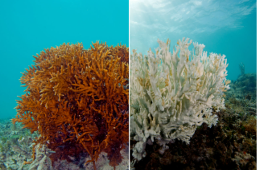

Coral Bleaching
British Virgin Islands: Hon. Vincent Wheatley, MHA Minister for Natural Resources, Labour and Immigration
In 2017, the British Virgin Islands were hit by Hurricane Irma, a Category 5 hurricane, which caused widespread destruction. Mr Wheatley stated that this devastation brought their way of life to a complete standstill. The British Virgin Islands continue to see stronger hurricanes, rising sea levels, increased flooding, ocean acidification and other climate change impacts. The impacts on their biodiversity is severely affecting their ecosystems and economy.
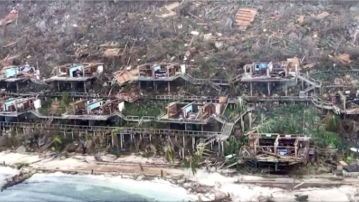

Destruction caused by Hurricane Irma in the British Virgin Islands
During the panel, Angela Burnett Penn, the climate change officer from the British Virgin Islands, delivered a presentation on the challenges and opportunities for BOTs accessing climate finance. She noted the lack of access of the BOTs to International Climate Finance due to their political status but acknowledged their access to UK Funds such as Darwin Plus, the Blue Belt Programme and the Integrated Security Fund which have been instrumental in helping BOTs protect their environments.
Pitcairn Islands
The beaches of the Pitcairn Islands, among the most remote in the world, are facing an alarming influx of global debris. Tonnes of plastic and other waste are being washed ashore, disrupting the delicate habitats of the region’s unique and endemic species, threatening their survival.
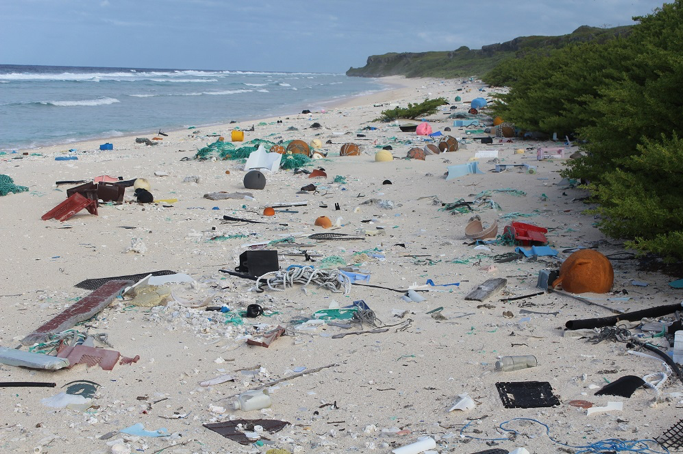

Plastic on Henderson Island
Tristan da Cunha
Tristan da Cunha is one of several BOTs that have taken ambitious steps to protect and manage their Marine environments through the blue belt initiative. Their Marine Protection Zone is the largest in the Atlantic.
South Georgia and the South Sandwich Islands: Dr Mark Belchier, Government
The Government for South Georgia and the South Sandwich Islands have declared a very large marine protected area, with extensive no-take zones which stretch 50km either side of the mid-point of the trench. Dr Belchier explained, through a video played at the event (click here), that these measures protect the most vulnerable and diverse marine habitats.
South Georgia and the South Sandwich Islands was labelled by Sir David Attenborough as a ‘global rarity’. Scientists have now discovered that the Southern Ocean absorbs over twice as much carbon from the atmosphere than the Amazon rainforest. By protecting these waters we are helping the entire planet.
St Helena: Elizabeth Clingham, St Helena Blue Belt Manager
In 2016, St Helena designated a Marine protected area which affords protection to over 440,000 square miles of ocean. Ms Clingham also noted that the protected area sets out the Marine environment’s monitoring so that it can track changes occurring to habitats and biodiversity.
During the panel discussion the Minister for Environment, Natural Resources and Planning, Christine Scipio made a statement about the remarkable progress St Helena has made in protecting their oceans and ecosystems. She stated that with support from the UK Government and homegrown efforts, St Helena’s research initiatives provide dual benefits for both climate and nature, whilst building resilience against future challenges.
Ascension Island: Cllr. Alan Nicholls, Ascension Island Government
Cllr Nicholls stated that through Ascension Island’s network of marine and terrestrial protected areas, ecosystems are being given a fighting chance to adapt to climate change. He observed that these actions could be the difference between the extinction of species and preserving Ascension Island’s precious biodiversity.
Anguilla: Quincia Gumbs-Marie, Anguilla Parliamentary Secretary
Ms Gumbs-Marie brought attention to the amount of work Anguilla has completed in order to tackle climate change. She noted that one of the most instrumental steps taken by Anguilla has been the development of the Blue Anguilla Task Force. It ensures the focus on mitigation, adaptation and building a climate resilient economy.
The Falkland Islands: Dr Andrea Clausen, The Falkland Islands Government Director of Natural Resources
Dr Clausen stated, “Our fisheries are leaders in seabird and mammal bycatch mitigation and we are working towards designating our first Marine managed areas in order to protect our valuable biodiversity”. The Falkland Islands are doing this through supporting scientific research and by providing critical gateways for the Antarctic and South Atlantic in order to better understand the environmental challenges the Falklands face and the resources they need to adapt to climate change.
The Cayman Islands: Gina Ebanks-Petrie, Director of Cayman Islands Department of Environment
Caymanians are doing their best to protect what they call carbon sinks. Mangrove wetlands and seagrass beds in the Cayman Islands are some of the best in terms of natural areas at storing and sequestering carbon. Ms Ebanks-Petrie praised the recent efforts in the Cayman Islands to protect more of their marine environment.
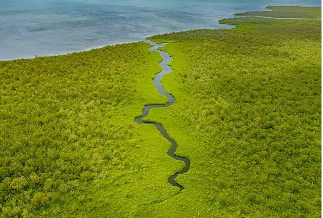

The Central Mangrove Wetlands, The Cayman Islands
Turks and Caicos Islands: Hon. Josephine Connolly, Turks and Caicos Islands Environment Minister
Recently there has been an increased intensity of storms experienced by the Turks and Caicos Islands. These storms have severely eroded their coastlines and caused damage to marine and terrestrial habitats, and physical infrastructure. Ms Connolly commented that to mitigate against this impact, the Turks and Caicos Islands have made it mandatory to have setbacks of at least 100 feet in developed areas to allow for coastal vegetation to remain intact. The Islands are strengthening their workforce and policies to better protect the coral reefs and mangroves that serve as a frontline defence to the Islands during storms.
The link to the panel discussion can be found here.
Island Voices @COP29
Island Innovation hosted the “Island Voices @COP29” virtual space to share key insights and developments related to island communities.
Island Innovation provided an opportunity for 8 participants from the Caribbean Climate Justice Leaders Academy to attend COP29 in Baku, where they served as envoys for their island communities. Among the 8 participants was Noelle Young from Bermuda. Noelle is also a representative for the International Climate Collaboration. During an interview Noelle commented on the significant challenges Bermuda is facing due to climate change - rising sea levels, more intense hurricanes and the risk to food security. She stated that the vulnerability of small island states is amplified by limited land, resources and a heavy reliance on healthy oceans. Noelle believes that in order to make meaningful impacts against climate change we need a unified front that acknowledges both the shared impacts and the inequities between regions.
On Wednesday 20th November, Island Voices @COP29 hosted a session titled Implementing Climate Finance Strategies for Subnational Island Jurisdictions and Overseas Territories. The event featured prominent representatives from the BOTs, including Angel Burnett Penn, Environmental Officer for the Government of the British Virgin Islands, and the Hon. Josephine Connolly, Minister of Tourism for the Turks and Caicos Islands Government, who shared insights on advancing climate finance initiatives. The Hon. Josephine Connolly recognised the pressing challenges of climate change which she said disproportionately affect the Turks and Caicos Islands as they have had such little input into global carbon emissions, but end up being a substantial burden. The Turks and Caicos Islands have witnessed first hand how extreme weather events disrupt not only the environmental equilibrium but also their social and economic stability. Ms Connolly highlighted the need for a strategic approach to climate finance as Island economies are predominantly dual in nature, relying heavily on tourism and natural resource dependent sectors like fishing, which are highly sensitive to climate risk. She said that substantial investment in climate adaptation and mitigation measures is required in order to mobilise the necessary resources to implement measures such as coastal protection structures and transitioning to renewable resources. Therefore, assessing climate finance demands mechanisms specifically attuned to their smaller scale and unique governance structure and vulnerabilities.
St Helena Delegation
A delegation composed of the Minister for Environment, Natural Resources and Planning, Christine Scipio, and SHG UK representative, Kendall Worboys MBE, represented St Helena at COP29.
The delegation was actively engaged at COP29 by attending side events at various pavilions. These discussions addressed topics directly impacting island nations like St Helena. Minister Scipio spoke at the UK Pavilion panel event detailed above and a discussion on “Islands, Oceans and the Climate: The Role of Sub-National Island Jurisdictions” as part of Island Voices @COP29.
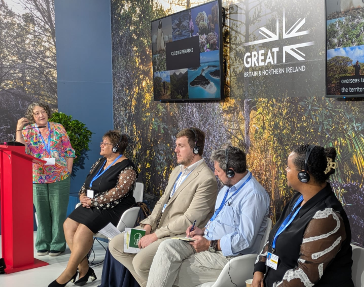

The Hon Christine Scipio (second from left) presenting at the UK Pavilion
Kedell Worboys plays a key role as Chair of the UK Overseas Territories Association (UKOTA) Environment Group. Mrs Worboys has been instrumental in co-ordinating the participation of all BOTs at COP29, including securing a dedicated side event in the UK Pavilion.
Montserrat
Montserrat’s Premier and Minister of Finance, Honourable Reuben T. Meade attended COP29 in Baku. On Tuesday 12th November, the Premier attended his first session of the COP29 Conference, supported by Energy Officer, Mr. Oswen Carty. This began a week of discussions with the focus on global initiatives towards the adaptation and mitigation of climate change and the various possible funding opportunities available to countries that wish to pursue a climate change adaptation/mitigation agenda.
The Hon. Premier was invited to participate on a Panel with other regional and global specialists. The Panel’s theme was ‘Empowering the Energy Transition: Caribbean Islands Leading the Shift from Fossil Fuels to Renewables’. The discussion focused on exploring the economic impacts of fossil fuel reliance, the potential of renewable energy sources - including solar, wind, geothermal, and biomass - and the unique opportunities and barriers that lie ahead for the region.
Premier Meade’s intervention highlighted Montserrat’s similar yet unique challenges in the area of climate change adaptation. He underscored this by providing examples of Montserrat’s historical progress, current challenges and potential opportunities for production of renewable energy. He continued to stress the importance of renewable energy in the long-term development of Montserrat and echoed the call for targeted climate financing.
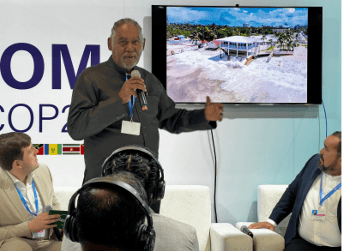

Premier Meade presenting at COP29
